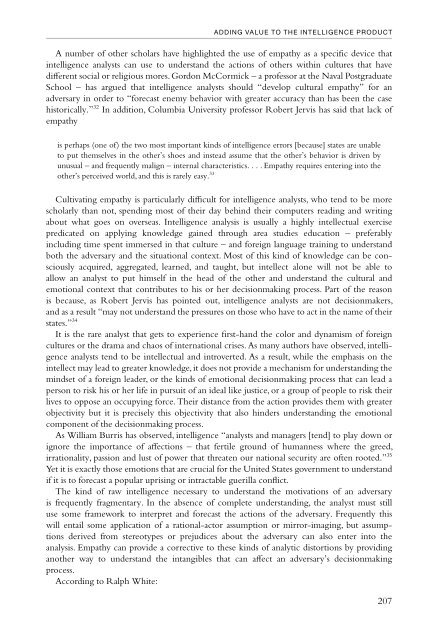Handbook of intelligence studies / edited by
Handbook of intelligence studies / edited by
Handbook of intelligence studies / edited by
You also want an ePaper? Increase the reach of your titles
YUMPU automatically turns print PDFs into web optimized ePapers that Google loves.
ADDING VALUE TO THE INTELLIGENCE PRODUCT<br />
A number <strong>of</strong> other scholars have highlighted the use <strong>of</strong> empathy as a specific device that<br />
<strong>intelligence</strong> analysts can use to understand the actions <strong>of</strong> others within cultures that have<br />
different social or religious mores. Gordon McCormick – a pr<strong>of</strong>essor at the Naval Postgraduate<br />
School – has argued that <strong>intelligence</strong> analysts should “develop cultural empathy” for an<br />
adversary in order to “forecast enemy behavior with greater accuracy than has been the case<br />
historically.” 32 In addition, Columbia University pr<strong>of</strong>essor Robert Jervis has said that lack <strong>of</strong><br />
empathy<br />
is perhaps (one <strong>of</strong>) the two most important kinds <strong>of</strong> <strong>intelligence</strong> errors [because] states are unable<br />
to put themselves in the other’s shoes and instead assume that the other’s behavior is driven <strong>by</strong><br />
unusual – and frequently malign – internal characteristics. ... Empathy requires entering into the<br />
other’s perceived world, and this is rarely easy. 33<br />
Cultivating empathy is particularly difficult for <strong>intelligence</strong> analysts, who tend to be more<br />
scholarly than not, spending most <strong>of</strong> their day behind their computers reading and writing<br />
about what goes on overseas. Intelligence analysis is usually a highly intellectual exercise<br />
predicated on applying knowledge gained through area <strong>studies</strong> education – preferably<br />
including time spent immersed in that culture – and foreign language training to understand<br />
both the adversary and the situational context. Most <strong>of</strong> this kind <strong>of</strong> knowledge can be consciously<br />
acquired, aggregated, learned, and taught, but intellect alone will not be able to<br />
allow an analyst to put himself in the head <strong>of</strong> the other and understand the cultural and<br />
emotional context that contributes to his or her decisionmaking process. Part <strong>of</strong> the reason<br />
is because, as Robert Jervis has pointed out, <strong>intelligence</strong> analysts are not decisionmakers,<br />
and as a result “may not understand the pressures on those who have to act in the name <strong>of</strong> their<br />
states.” 34<br />
It is the rare analyst that gets to experience first-hand the color and dynamism <strong>of</strong> foreign<br />
cultures or the drama and chaos <strong>of</strong> international crises. As many authors have observed, <strong>intelligence</strong><br />
analysts tend to be intellectual and introverted. As a result, while the emphasis on the<br />
intellect may lead to greater knowledge, it does not provide a mechanism for understanding the<br />
mindset <strong>of</strong> a foreign leader, or the kinds <strong>of</strong> emotional decisionmaking process that can lead a<br />
person to risk his or her life in pursuit <strong>of</strong> an ideal like justice, or a group <strong>of</strong> people to risk their<br />
lives to oppose an occupying force. Their distance from the action provides them with greater<br />
objectivity but it is precisely this objectivity that also hinders understanding the emotional<br />
component <strong>of</strong> the decisionmaking process.<br />
As William Burris has observed, <strong>intelligence</strong> “analysts and managers [tend] to play down or<br />
ignore the importance <strong>of</strong> affections – that fertile ground <strong>of</strong> humanness where the greed,<br />
irrationality, passion and lust <strong>of</strong> power that threaten our national security are <strong>of</strong>ten rooted.” 35<br />
Yet it is exactly those emotions that are crucial for the United States government to understand<br />
if it is to forecast a popular uprising or intractable guerilla conflict.<br />
The kind <strong>of</strong> raw <strong>intelligence</strong> necessary to understand the motivations <strong>of</strong> an adversary<br />
is frequently fragmentary. In the absence <strong>of</strong> complete understanding, the analyst must still<br />
use some framework to interpret and forecast the actions <strong>of</strong> the adversary. Frequently this<br />
will entail some application <strong>of</strong> a rational-actor assumption or mirror-imaging, but assumptions<br />
derived from stereotypes or prejudices about the adversary can also enter into the<br />
analysis. Empathy can provide a corrective to these kinds <strong>of</strong> analytic distortions <strong>by</strong> providing<br />
another way to understand the intangibles that can affect an adversary’s decisionmaking<br />
process.<br />
According to Ralph White:<br />
207
















